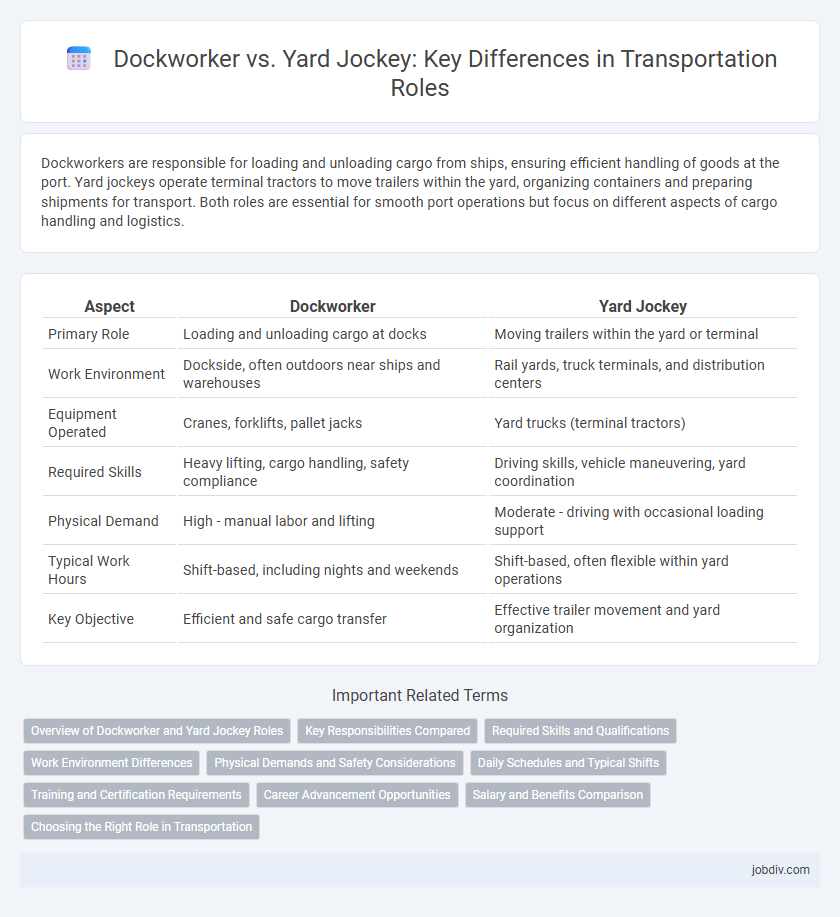Dockworkers are responsible for loading and unloading cargo from ships, ensuring efficient handling of goods at the port. Yard jockeys operate terminal tractors to move trailers within the yard, organizing containers and preparing shipments for transport. Both roles are essential for smooth port operations but focus on different aspects of cargo handling and logistics.
Table of Comparison
| Aspect | Dockworker | Yard Jockey |
|---|---|---|
| Primary Role | Loading and unloading cargo at docks | Moving trailers within the yard or terminal |
| Work Environment | Dockside, often outdoors near ships and warehouses | Rail yards, truck terminals, and distribution centers |
| Equipment Operated | Cranes, forklifts, pallet jacks | Yard trucks (terminal tractors) |
| Required Skills | Heavy lifting, cargo handling, safety compliance | Driving skills, vehicle maneuvering, yard coordination |
| Physical Demand | High - manual labor and lifting | Moderate - driving with occasional loading support |
| Typical Work Hours | Shift-based, including nights and weekends | Shift-based, often flexible within yard operations |
| Key Objective | Efficient and safe cargo transfer | Effective trailer movement and yard organization |
Overview of Dockworker and Yard Jockey Roles
Dockworkers handle the loading and unloading of cargo from ships, ensuring proper stacking and securing of goods on the dock. Yard jockeys operate terminal tractors to move trailers within shipping yards, facilitating efficient trailer placement and organization. Both roles are essential for maintaining smooth logistics and minimizing turnaround times in port operations.
Key Responsibilities Compared
Dockworkers primarily focus on loading and unloading cargo from ships, ensuring proper handling and securing of goods to maintain shipment integrity. Yard jockeys are responsible for moving trailers and containers within the yard, positioning them for efficient loading or unloading operations. Both roles are critical for seamless port logistics, but dockworkers handle direct cargo interaction, while yard jockeys manage internal vehicle and equipment movement.
Required Skills and Qualifications
Dockworkers require strong physical stamina, proficiency in operating forklifts, and knowledge of cargo handling techniques to efficiently load and unload shipments. Yard jockeys must possess excellent driving skills, experience with terminal tractors, and a solid understanding of yard safety protocols to maneuver trailers within the facility. Both roles demand attention to detail, teamwork, and compliance with OSHA regulations to ensure safe and smooth terminal operations.
Work Environment Differences
Dockworkers primarily operate on shipping docks, handling cargo loading and unloading in dynamic, often outdoor environments exposed to weather conditions. Yard jockeys work within container yards or terminals, maneuvering trucks and trailers in a more controlled, structured space with heavier emphasis on vehicle operation and coordination. Both roles require safety precautions, but dockworkers face greater physical demands and environmental variability.
Physical Demands and Safety Considerations
Dockworkers face intense physical demands including heavy lifting, prolonged standing, and frequent bending, which heightens the risk of musculoskeletal injuries and requires rigorous adherence to safety protocols such as proper lifting techniques and personal protective equipment. Yard jockeys operate terminal tractors in confined spaces, demanding sharp focus and precise maneuvering to avoid collisions and accidents, emphasizing the importance of situational awareness and vehicle safety inspections. Both roles require strict compliance with Occupational Safety and Health Administration (OSHA) regulations to mitigate workplace hazards and ensure operational safety.
Daily Schedules and Typical Shifts
Dockworkers typically operate on rigid daily schedules aligned with vessel arrivals and cargo unloading times, often working early morning to late evening shifts that can extend beyond 8 hours depending on port activity. Yard jockeys have more flexible shifts centered around yard operations, including moving trailers and containers within the terminal, often working rotating or split shifts to maintain continuous yard flow. Both roles require synchronization with shipping schedules but differ in task focus and shift structure to optimize terminal efficiency.
Training and Certification Requirements
Dockworkers typically require specialized training in cargo handling, safety protocols, and equipment operation, often obtaining certifications such as OSHA forklift and hazardous material handling licenses. Yard jockeys must complete commercial driver's license (CDL) programs, focusing on maneuvering trailers within yard facilities and mastering vehicle safety inspections. Both roles demand rigorous safety training, but dockworkers emphasize manual cargo expertise while yard jockeys prioritize driving skills and regulatory compliance.
Career Advancement Opportunities
Dockworkers typically advance by gaining specialized skills in cargo handling and certifications in hazardous materials, leading to supervisory or safety inspector roles. Yard jockeys often progress by mastering vehicle operation and logistics coordination, enabling transitions into yard management or fleet supervisor positions. Both careers benefit from experience and training, but dockworkers generally have more diverse pathways into operational and managerial roles within port and shipping facilities.
Salary and Benefits Comparison
Dockworkers typically earn between $35,000 and $55,000 annually, with benefits including health insurance, retirement plans, and overtime pay reflecting their physically demanding work loading and unloading cargo. Yard jockeys usually have a salary range of $30,000 to $45,000 per year, with benefits similar to dockworkers but often with fewer overtime opportunities due to their role in moving trailers within the yard. Both positions offer job stability and union representation in many ports, but dockworkers generally receive higher overall compensation due to the increased labor intensity and hazardous conditions.
Choosing the Right Role in Transportation
Dockworkers specialize in loading and unloading cargo at ports, using heavy equipment and coordinating ship schedules, which requires physical strength and safety awareness. Yard jockeys operate terminal tractors to move trailers within a facility, emphasizing precision driving and efficient yard management to streamline logistics workflows. Selecting the right role depends on whether you prefer hands-on cargo handling at docks or vehicle maneuvering within yard environments.
Dockworker vs Yard Jockey Infographic

 jobdiv.com
jobdiv.com